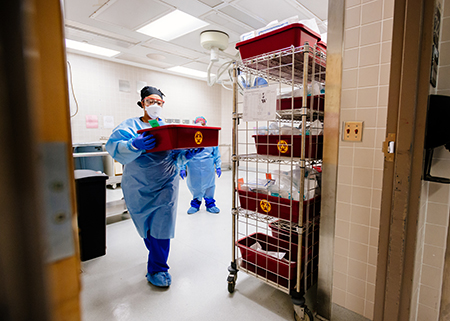By Tyler Greer
UAB News
Medical and administrative leaders within University of Alabama at Birmingham Hospital gathered in early March to address what — at the time — seemed like more than an imminent threat. It seemed to be a foregone conclusion.
Some personal protective equipment, or PPE, was going to run out, and it was going to run out fast.
N95 respirators, face shields, gowns, gloves and other supplies were a concern. Seven weeks later, the unease is still very real even though the surge in novel coronavirus, or COVID-19, patients in central Alabama and at UAB Hospital has not been as overwhelming as feared. The fact is that personal protection equipment was in short supply well before the world was turned upside down by the spread of COVID-19.
And it still is.
One of the biggest supply concerns at UAB and hospitals beyond has been and continues to be N95 respirators, a protective device designed to achieve a very close facial fit and very efficient filtration of airborne particles — critical protection for health care workers treating patients with COVID-19.
JOIN THE FIGHT against coronavirus and be part of UAB’s mission to defeat COVID-19.
 After two weeks of discussion and simulations that began at the beginning of March, UAB has adopted and is currently implementing three different sterilization strategies to reprocess N95s. The strategies include V-PRO sterilization, bioquell hydrogen peroxide machine decontamination and ultraviolet germicidal irradiation.
After two weeks of discussion and simulations that began at the beginning of March, UAB has adopted and is currently implementing three different sterilization strategies to reprocess N95s. The strategies include V-PRO sterilization, bioquell hydrogen peroxide machine decontamination and ultraviolet germicidal irradiation.
“These are unusual times for all health care workers across the nation. We’re facing a pandemic, and we don’t have the supplies available to care for these patients,” said Rachael Lee, M.D., assistant professor in the UAB School of Medicine’s Division of Infectious Diseases and the hospital’s health care epidemiologist. “Every hospital is looking at ways to safely reprocess their respirators so that we can protect our health care workers and provide the care we need to provide to these patients. What we’re doing has the best available evidence with it and research behind it, and I feel confident that what we’re doing is the right pathway until we can get a steady stream of N95s coming back into the system.”
When will that happen? According to Laura Kowalczyk, vice president of Supply Chain Services for UAB Medicine, replenishing the supply of N95 respirators and some other equipment is going to be a struggle that will stretch over a period of months.
“Our challenges aren’t on the horizon. They are now. And what we need is no different from that of our peers around the country,” Kowalczyk said. “Nationally we are all struggling. It’s certainly going to continue to be an issue for us, and we anticipate its being an ongoing issue well into the summer and early fall.”
That is why the N95 reprocessing strategies enacted at UAB are vital. They are helping to extend use of N95s and have, for now, kept the hospital from running out of masks at an accelerated rate.
Since the hospital began the three decontamination techniques March 21, more than 8,000 N95 respirators have been reprocessed for use multiple times. N95s can potentially be reprocessed and reused up to 10 times, as long as they continue to hold their seal to the face.
“Our health care providers write their names on their N95s, and after units are done using them, they are collected and sent to a processing area where they go through the sterilization process,” said Frank Sortino, a UAB Medicine administrator and a leader in the N95 decontamination efforts. “As long as the mask continues to fit their face properly and securely, they can wear them. Our health care providers know to look for any defects. If there are defects, the provider can throw the mask away and get a new one.”The V-PRO technique has been approved by the Food and Drug Administration. Research at Duke University and the University of Nebraska proved the efficacy of the bioquell and UV techniques.
“All of these processes decontaminate or sterilize the masks, and there is no coronavirus on them,” Lee said. “The biggest concern we have is to make sure the mask still works as a respirator after the decontamination process is complete. That’s where we’re being careful, in making sure the masks continue to fit to the face and that we can continue to use them. As we’re flattening the curve, the hope is that we will be able to open up and get back to business as usual; but there is a concern we will continue to see patients with COVID-19. Based on that, we have to be prepared. Talking to our logistics team, it sounds like those N95 masks are going to continue to be delayed coming into our health care system. We’re going to have to be able to extend our supply as much as we possibly can. We will likely continue this into the foreseeable future until we have a steady supply of N95 respirators.”





